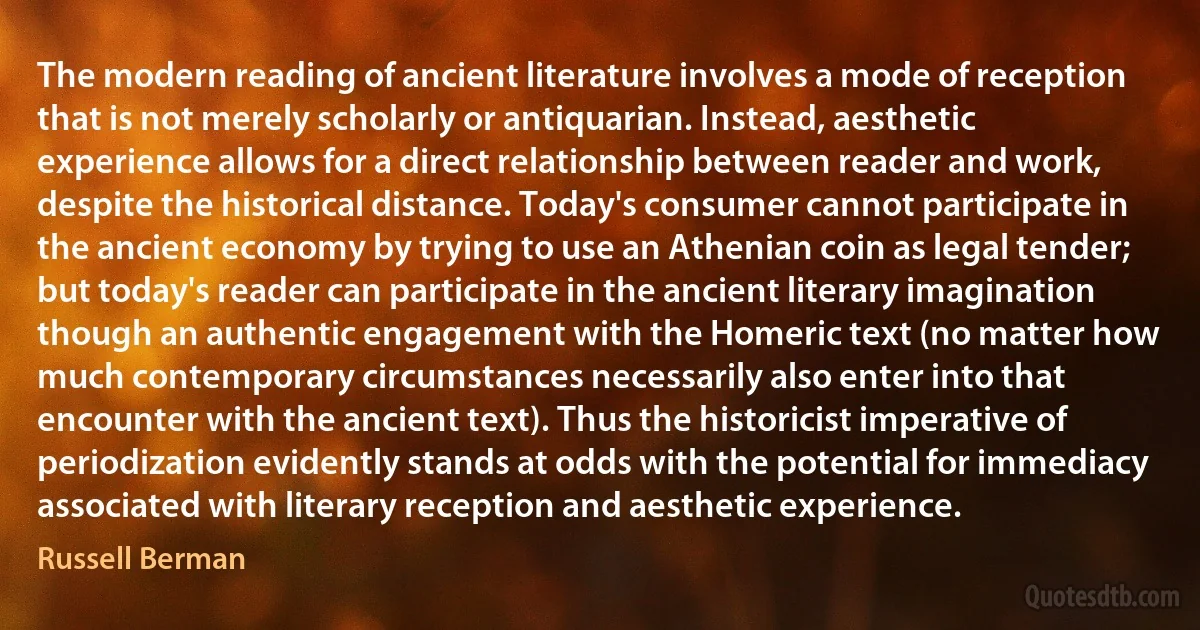
The modern reading of ancient literature involves a mode of reception that is not merely scholarly or antiquarian. Instead, aesthetic experience allows for a direct relationship between reader and work, despite the historical distance. Today's consumer cannot participate in the ancient economy by trying to use an Athenian coin as legal tender; but today's reader can participate in the ancient literary imagination though an authentic engagement with the Homeric text (no matter how much contemporary circumstances necessarily also enter into that encounter with the ancient text). Thus the historicist imperative of periodization evidently stands at odds with the potential for immediacy associated with literary reception and aesthetic experience.
Russell BermanRelated topics
aesthetic antiquarian athenian authentic coin consumer contemporary distance enter experience historical immediacy imperative matter reading tender text thus trying use work circumstancesRelated quotes
Dada is a farce, a legend, a state of myth. A badly behaved myth whose subterranean survival and capricious manifestation upset everyone.. .The aesthetic of absolute negativity has been changed into methodical doubt, thanks to which it will finally be able to incarnate new signs.. .After the NO and the ZERO, there is a third position for the myth; the anti-art gesture of Marcel Duchamp has been charged with positive energy. The Dada spirit identifies itself with a method of appropriation of exterior reality of the modern world.. .The ready-made is no longer the height of negativity or of polemic, but the basis element of a new expressive repertoire. Such is the New Realism: a direct means for getting one's feet back on the ground but at 40 degree above Dada zero.

Gerhard Richter
For this is our central human problem: that we are almost constantly the victims of our emotions, always being swept up and down on a kind of inner-switchback. We possess a certain control over them; we can 'direct our thoughts' -- or feelings -- in such a way as to intensify them. This is certainly our most remarkable human characteristic: imagination. Animals require actual physical stimuli to trigger their experience. A man can retreat into a book -- or a daydream -- and live through certain experiences quite independent of the physical world. He can even, for example, imagine a sexual encounter, and not only experience all the appropriate physical responses, but even the sexual climax. Such a curious ability is far beyond the power of any animal.

Colin Wilson
We have an odd relationship with words. We learn a few when we are small, throughout our lives we collect others through education, conversation, our contact with books, and yet, in comparison, there are only a tiny number about whose meaning, sense, and denotation we would have absolutely no doubts if, one day, we were to ask ourselves seriously what they meant. Thus we affirm and deny, thus we convince and are convinced, thus we argue, deduce, and conclude, wandering fearlessly over the surface of concepts about which we have only the vaguest of ideas, and, despite the false air of confidence that we generally affect as we feel our way along the road in the verbal darkness, we manage, more or less, to understand each other and even, sometimes, to find each other.

José Saramago
...it was Darwin's chief contribution, not only to Biology but to the whole of natural science, to have brought to light a process by which contingencies a priori improbable, are given, in the process of time, an increasing probability, until it is their non-occurrence rather than their occurrence which becomes highly improbable. ... Let the reader ... attempt to calculate the prior probability that a hundred generations of his ancestry in the direct male line should each have left at least one son. The odds against such a contingency as it would have appeared to his hundredth ancestor (about the time of King Solomon) would require for their expression forty- four figures of the decimal notation; yet this improbable event has certainly happened.

Ronald Fisher
We have come to the end of a chapter in our industrial history. The industrial system to which the Tory Party adheres-at least officially and in its manifestos-has failed us. ... It is no use blaming working people or the unions if they have to work in ancient factories with obsolete equipment producing old-fashioned goods at unecomonic prices and earning low wages as well. Working people not only are not responsible for the weakness of British manufacturing industry. They have hitherto been denied the tools and tackle that they needed to put it right. ... We have got to make a fresh start now. We have got to get investment up, and to get it up as soon as we can. If the market economy cannot or will not give us that investment, we must do it direct.

Tony Benn
